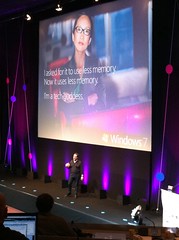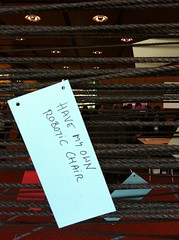LIFT 2011
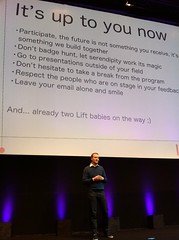 Another year, another LIFT. I didn't blog the sessions as-they-went this year, for lots of reasons: they're streamed quite nicely nowadays; Twitter has well and truly replaced my live-blogging urges with a flow of instant pith; and I've found my ideal conference bag combo (iPad+iPhone, for 2-screen action) which doesn't let me type fast enough. Plus I thought I'd try and pay attention this year. You know, just for a change.
Another year, another LIFT. I didn't blog the sessions as-they-went this year, for lots of reasons: they're streamed quite nicely nowadays; Twitter has well and truly replaced my live-blogging urges with a flow of instant pith; and I've found my ideal conference bag combo (iPad+iPhone, for 2-screen action) which doesn't let me type fast enough. Plus I thought I'd try and pay attention this year. You know, just for a change.
So, brief notes follow.
Day One: Lady Gaga, Moustaches and Lossy Translations
- Macrowikinomics by Don Tapscott: a good run-through of "social software is changing the world" examples and a beautiful video of a murmuration but I didn't take away much of a conclusion from this one;
- Jean-Claude Biver was up next. I'd not heard of him but a few locals later apprised me of the high standing he's held in Switzerland. Like Don, I noticed he was using lots of technical language in his analogies (where Don spoke of "rebooting our institutions", Jean-Claude talked about education "formatting" children and wiping away their creativity). Like Don, rousing but I didn't feel I learned much: "failure is the only learning process" is a great soundbite, and I happen to think it may be true, but hearing it doesn't help me build a creatively strong organisation;
- David Galbraith gave what I felt was a strong talk, looking at 4 trends he'd identified: drawing a line from Rudolph Valentino to Lady Gaga, he put forward an economic model for celebrity (marred only by his insistence on financial valuations for data traffic built on the value-based pricing of SMS); real-person recommendations replacing algorithmic ones of Google et al (I wasn't convinced by this - it plays well to the "humans will also be superior" gut feeling our race naturally shares, but Dunbar's going to impose a limit on what you can achieve here IMHO); people-powered design (products designed for consumers outpacing those designed for enterprises, which we see with GMail vs Outlook); and the rise of separate public and corporate internets (the needs of financial services and markets meaning long-term we'll either lose net neutrality, get government-controlled networks, or have a separate corporate intranet);
- Ben Hammersley and his amazing moustache followed up with a talk entitled "Post-Digital Geopolitics": we're societally confused because the factor which we used to use to differentiate ourselves from others, distance, is less relevant nowadays. I didn't quite agree with his assertions that the Cold War fight against Russia was fundamentally different to contemporary battles against Al Qaeda (in both cases it was the West vs an ideology, manifested in many places), or that September 11th changed everything; but his conclusion that my generation's role is to translate between the worlds of those older and younger seemed reasonable... just as I suspect it has been for every such generation in the past.
- Alexander Osterwald (whose recent book I later realised sits, sadly unread, on my work-related reading pile) gave a sensible and solid talk about the need for startups to model a variety of different business models. Seems sensible, but I'd be horrified to think most people weren't already doing this.
- Then Dorian Selz, on virtual organisations. I was frustrated by this talk: clearly Dorian has managed to do what a few others (MySQL, 37signals) have managed, and many others have tried and failed to do. That said, I found his advice unhelpfully simple - "get rid of project managers" is a good rallying cry for anyone who's been badly managed or resents management, but I can't help feeling there's more to his success than this, and that perhaps he's internalised his lessons or is just innately really great at running an organisation;
- Couple Alexandra Bau and Birgitta Ralston followed, with a very personal story of building companies and a fantastic-looking home. I'm ashamed to say my notes are limited here, I was fading a little.
- Yasmine Abbas was next, on designing for transients - digita neo-nomads. It sounded interesting, and most of her subjects were probably watching in the room...
- ...and finally Jennifer Gay gave a 5-minute and deeply personal look into the world of professional translators; arguing that automated translations are naturally lossy and therefore not a huge threat to the high-end professionals, whilst confessing that cheap/instantaneous/approximate might present a threat to elegant/accurate/slower/costly human translators. I never knew the first simultaneous translations happened at Nuremberg (and threw the profession into turmoil); and I hadn't thought about the unique problems an event like LIFT might pose her trade, consisting as it does of constant shifts into the jargon of different domains. Respect due.
Day Two: Niche Communities, Understanding User Needs, and RoboMusic for Dyslexics
- Argh! I overslept and missed most of what looked like a really interesting and practically-focused talk from Tiffany St James. I'll need to go back for the video...
- Chris Heathcote took second spot, talking about those communities which tend to fall into the shadow of Facebook: USenet, mailing lists, and especially Grindr and Gaydar. Really nicely put together (especially the lavishly-gathered map of Grindr search results volume, put together over what was clearly a hard Saturday nights work). Everything becomes a community, it turns out; people want to talk and will duct-tape a conversational service like PingChat onto the likes of Grindr to help them do so. Oh, and a lovely soundbite: "Maps are the Hello, World of data";
- Azeem Azhar spoke next about online reputation and its importance for communities. The financial crisis (referenced by many speakers) gave us an opportunity to see what happens when the web of trust which supports a market-based economy is taken away: when Standard & Poor ratings no longer counted, governments had to step in. The notion of brands as proxies for personal trust had, annoyingly, not occurred to me before;
- Then, Steve Portigal. I've been a fan of Steve ever since reading an excellent article he wrote on personas and how they're frequently abused in the design process, and he didn't disappoint. His talk focused on research activities: how to understand user needs, particularly latent ones, and he gave a huge range of practical advice here: role-play, logging, homework, stimuli, participatory design (explained nicely as "people thinking they're talking about solutions whilst actually expressing needs"), and so on. He called for greater comfort with ambiguity (something we've noted is more important if you head down an avenue marked "agile"), and for researchers to reframe how organisers think by creating new stories, freeing designers up to manifest these stories. All good stuff;
- Having surfed on endorphin through Steve's talk, I crashed and missed most of Nick Coates on co-creation, and Thomas Sutton of Frog Design. I surfaced again in the afternoon, jolted awake by Yuri Suzuki and his "music for dyslexics" project: gorgeous stuff linking visuals to sound generation, often with a side-order of home robotics.
Day two ended with the ALP Venture Night, a presentation from 8 startups. Two stood out for me - Atracsys, who do interactive surface and projection displays, and NViso who do real-time emotional analysis of faces. Both quite interesting businesses, but I was struck by how many of the startups focussed on their product and features whilst giving little indication of how they would sell it or make any money. I didn't get much out of Scoble's closing talk - it was a walkthrough of a load of Valley startups, but with so many mentioned none of them benefitted from any depth of analysis.
Day Three: Rent Your Clothes, Algorithmic Feedback Loops, Robots and Space Travel
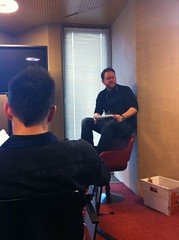 Day three kicked off extra-early for me. I managed to get a place on the workshop Christian Miccio ran, "Let's create a product again". It was a repeat of the same format he'd used the previous year, which I'd also wanted to go to - but he had clashed with my own repeat of Mobile Mountains (which I think is similarly themed: "let's make something, quickly").
Day three kicked off extra-early for me. I managed to get a place on the workshop Christian Miccio ran, "Let's create a product again". It was a repeat of the same format he'd used the previous year, which I'd also wanted to go to - but he had clashed with my own repeat of Mobile Mountains (which I think is similarly themed: "let's make something, quickly").
I and a few other volunteer Product Managers arrived 45 minutes early, and brainstormed some ideas for products. Unlike most brainstorms I've run, Christian started out with no constraints at all... which was liberating if initially quite daunting. Our little group managed to come out with a diverse range of ideas:
everything from an ATM finder through a Kindle-for-sketching (which I note someone has done), through to travel assistants. We settled on a rental business for clothes: as a traveller, arrive in a city and you can have the clothes you need for your trip ready and waiting for you. The rest of the group arrived, we presented the idea to them... then listened to their reactions, answered questions and gathered feedback.
They had a ton to say: hygiene was an issue for some (though we felt this was a problem the hotel industry had successfully dealt with), as was clothing-as-identity. Could they buy clothes they liked? Buy locally appropriate outfits? Would this be appropriate for men and women? And was it, as one person noted "like James Bond"? We noted this all down, sent our erstwhile customers away to caffeinate, and Christian gave us some feedback on our performance so far: rightly chiding me for selling the idea to the audience rather than presenting it, steering us away from thinking about pricing so early, and discussing the key issues of hygiene, identity and gender.
We reconvened, and presented a more focussed product: a convenience-oriented version stocking suits, tuxedos and shirts in major European business cities. Feedback from customers was correspondingly more specific, around product details and pricing. They generally preferred this version too.
An interesting exercise: in 2 hours we'd dreamed up a product, run 2 rounds of simplistic customer research, and come to something we and they were happy with. We had no idea of feasibility or the cost structure of the business of course, but left thinking that it might be worth looking into... and overall the session was really enjoyable. In my head, I likened it to a less tactical and more strategic complement to Mobile Mountains, though I think that may have been a function of the idea we had decided to work on (which was more of a business than a specific product), than the format Christian was using.
Talks followed:
- Hasan Elahi gave an entertaining talk about his choice to expose every aspect of his life online as a commentary on the US terrorist watch list;
- Tara Shears updated us on the latest from the Large Hadron Collider;
- Kevin Slavin did a phenomenally interesting presentation, drawing a line from techniques for stealth aircraft to frustrate radar (by making themselves appear to be many smaller objects, like a flock of birds) to black-box trading (where large financial transactions are broken up into tiny untrackable pieces). With 70% of trades apparently being either algorithmically driven trades or attempts to flush out the same, financial markets are dependent on network topologies: an office 200ms nearer an Internet hub can bring serious trading advantages. And with the financial crisis providing an example of the consequences of algorithmically driven supply and demand, where else might we see these closed loops appearing? In Hollywood, say, in a world where 61% of Netflix video rentals are rented on the basis of algorithmic recommendations, and where companies can algorithmically decide what films to make - implying our entertainment industry is due a banking-style flash-crash (if it isn't already in one). Fascinating;
- Sabine Hauert followed later with a great primer on the current state of robotics: both the hype the field receives ("I read robots can feed on dead bodies") and the reality of the Roomba, Google Car, and modern warehousing robots from the likes of Kiva Systems... stopping by gliding robot-swarms bringing ad hoc comms networks to disaster areas, the Google Lunar X prize, and ending in a call for Roboethics committees;
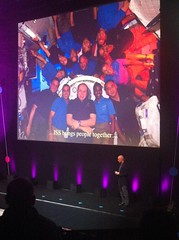
- ... and then I stopped taking notes, sat back and watched a quad of incredible presentations: Honor Harger of Lighthouse in Brighton, presenting her work on the sound of space; Lucie Green on the sun, Jennifer Magnolfi of Herman Miller on the problems of designing habitats for long-term life in space, and Claude Nicollier showing us his holiday snaps ("me fixing the Hubble telescope", "me in my space ship", etc.) - in an endearingly humble and fantastically uplifting fashion;
One of the things to love about LIFT is the obvious effort that Laurent and the organising team put into it. They're overtly self-critical and actively ask for, then act on, feedback from attendees. This year in his opening remarks Laurent talked about the need to balance far-looking stuff with more practical sessions, and I think they spent more time working with speakers to hone talks than normal.
The event had a really good hit rate of talks: David Galbraith, Steve Portigal, Kevin Slavin, and Claude Nicollier all really stood out for me, as did Sabine Heurt and Chris Heathcote. I took a lot away from the workshop Christian Miccio ran too.
Much of the more near-term stuff seemed to be around social media and reputation, which both felt a bit more mainstream than I'd expect from LIFT; they're the kind of things which get covered well elsewhere. But that's a minor quibble - there was plenty of amazing content, my head was stretched in new directions, and I left LIFT, as ever, already impatient for the next one.
